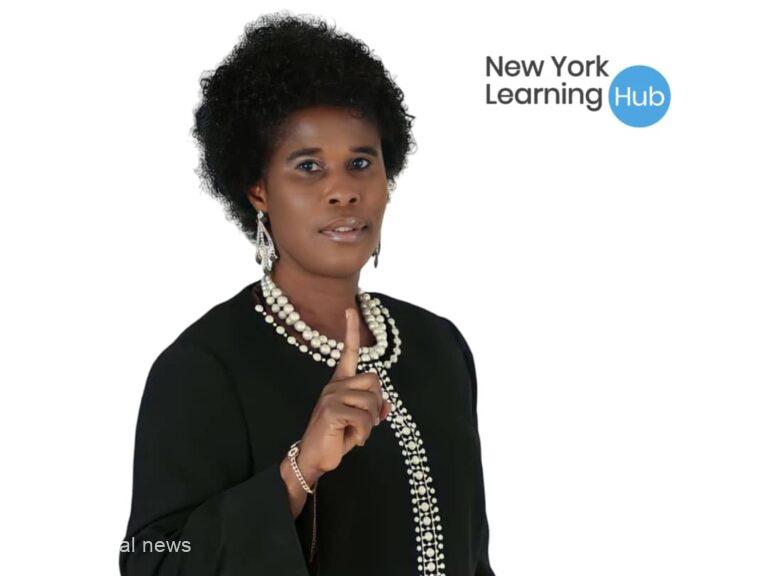In her groundbreaking presentation at the New York Learning Hub, Aisha Olagbegi unveiled her latest research titled ‘Strategic Management and Leadership in Modern Motherhood: Cultivating Future Leaders in the 21st Century,’ offering a profound exploration into the evolving role of motherhood. A distinguished alumnus and a luminary in the fields of Human Resource Management and Strategy, Aisha stands at the forefront of bridging theoretical frameworks with tangible, real-world applications. Her work is not only a reflection of her academic depth but also her commitment to practical solutions in the dynamic business landscape.
Aisha’s academic journey at the New York Learning Hub laid the foundation for her deep understanding of complex business and management paradigms. Her focus on Human Resource Management and Strategy provided her with unique insights into the nuances of organizational behavior and strategic decision-making. This expertise is vividly showcased in her research, which delves into the multifaceted role of modern motherhood through the lens of strategic management and leadership.
The research navigates the transformation of maternal roles amidst societal and technological shifts, underscoring the impact of maternal leadership on child development and the integration of strategic management principles in parenting. Aisha’s work ambitiously aims to illustrate the parallel between motherhood and leadership, offering insightful strategies for modern mothers. Her research is poised to enrich the leadership development literature by introducing a unique perspective on the influence of maternal leadership.
Aisha’s professional portfolio, marked by strategic thinking and policy formulation, complements her academic pursuits. Her ability to analyze, innovate, and implement effective strategies sets her apart as a visionary in her field. Her research is not just an academic endeavor but a reflection of her versatile capabilities as a thought leader in the contemporary business and management landscape.
Currently immersed in groundbreaking research in the field of management, Aisha plans to evolve her work into a trilogy of insightful publications. Her ambition and dedication are paving the way for new standards in innovation and excellence in Human Resources and Strategic Management.
The significance of Aisha’s research lies in its potential to redefine the perception of motherhood, highlighting its critical role in leadership development. By empowering modern mothers with strategic tools and insights, her work enables them to nurture the next generation of leaders effectively. Moreover, it contributes to both academic and practical understanding of the synergies between parenting, leadership, and strategic management, opening new avenues for research and application in these interwoven fields. In summary, Aisha Olagbegi’s contribution to this domain is not just an academic achievement but a milestone in redefining modern motherhood and its impact on future generations.
Full publication is below with the author’s full consent:
Abstract
Strategic Management and Leadership in Modern Motherhood: Cultivating Future Leaders in the 21st Century
1.1 Brief Overview of the Research Topic
This research delves into the multifaceted role of modern motherhood through the lens of strategic management and leadership, a realm traditionally confined to the corporate world. In the dynamic landscape of the 21st century, the roles and responsibilities of mothers have evolved, transcending conventional boundaries. This study seeks to unravel how the principles of strategic management and leadership, when applied to motherhood, can significantly contribute to cultivating future leaders. The premise is that motherhood, in its essence, involves complex decision-making, long-term planning, and influential leadership, paralleling the core aspects of strategic management in a business context.
1.2 Key Themes to be Explored
The research will navigate through several interrelated themes:
- Evolution of Motherhood: Examining the transformation of maternal roles in response to societal and technological changes.
- Leadership Development in Children: Investigating how mothers can employ strategic leadership tactics to nurture leadership qualities in their children.
- Balancing Dual Roles: Exploring the challenges and strategies involved in balancing career aspirations with effective parenting.
- Maternal Influence on Child Development: Understanding the impact of a mother’s leadership style on the overall development and future potential of her children.
- Integration of Strategic Management Principles: Assessing how concepts like decision-making, problem-solving, and long-term vision in the realm of strategic management can be adeptly applied to parenting.
1.3 Research Objectives and Significance
The primary objectives of this research are:
- To Illustrate the Parallel Between Motherhood and Leadership: Establishing motherhood as a form of strategic leadership and elucidating the similarities between managing a family and leading an organization.
- To Provide Insightful Strategies for Modern Mothers: Offering actionable strategies derived from management and leadership principles that can be implemented in day-to-day parenting.
- To Contribute to Leadership Development Literature: Enriching the discourse on leadership development by introducing the unique perspective of maternal influence.
The significance of this research lies in its potential to redefine the perception of motherhood, highlighting it as a critical platform for leadership development. It aims to empower modern mothers with strategic tools and insights, enabling them to effectively nurture the next generation of leaders. Furthermore, this study seeks to contribute to both academic and practical understanding of the synergies between parenting, leadership, and strategic management, opening new avenues for research and application in these interwoven fields.
Chapter 1: Introduction
1.1 Contextualizing Modern Motherhood in the 21st Century
Modern motherhood, especially in the context of the 21st century, is an evolving and multi-dimensional experience, marked by unprecedented challenges and opportunities. The traditional image of a mother as solely a caregiver has expanded dramatically, encapsulating roles as diverse as that of an educator, mentor, and often, a professional. This transformation is propelled by significant societal changes, including the rise of digital technology, shifts in family dynamics, and evolving gender roles. These changes have not only redefined the boundaries of parenting but have also placed new expectations on mothers. Today’s mothers are navigating a complex landscape where they are required to balance traditional family responsibilities with their personal and professional aspirations. This balance is often a delicate one, requiring a blend of resilience, adaptability, and strategic thinking – qualities that are quintessential in the corporate and leadership realms.
1.2 The Role of Mothers in Nurturing Future Leaders
The influence of a mother in shaping the leaders of tomorrow is an area of immense importance and potential. Mothers are often the primary architects of their children’s early worldview and value system. Through their daily interactions, guidance, and the environment they cultivate at home, mothers play a pivotal role in instilling qualities such as empathy, resilience, ethics, and the ability to navigate challenges – all crucial traits for future leaders. In the current era, where leadership is increasingly defined not just by authority but by the ability to inspire and effect positive change, the maternal role becomes even more significant. Mothers are uniquely positioned to mold future leaders who are not only successful in their professional endeavors but are also conscientious and responsible global citizens.
1.3 Purpose and Scope of the Research
This research aims to explore and articulate the vital role that modern mothers play in developing future leaders, through the application of strategic management and leadership principles. The scope of this study extends to examining how the dynamics of modern motherhood can be aligned with effective leadership strategies to foster a nurturing environment conducive to the holistic development of children. This includes investigating how decision-making, problem-solving, and visionary thinking, central to strategic management, can be integrated into parenting practices.
The research will encompass diverse aspects of modern motherhood, from the challenges of balancing work and family life to the impact of societal changes on parenting styles. It will also delve into the specific strategies that mothers can employ to nurture leadership qualities in their children, preparing them to thrive in an increasingly complex and interconnected world.
In doing so, the study seeks to contribute to the broader discourse on leadership development, while offering valuable insights and practical guidance to modern mothers. By highlighting the strategic dimensions of motherhood, the research aims to empower mothers to embrace their roles more effectively and to recognize the profound impact they have on shaping the leaders of the future.
This research will provide a comprehensive exploration of modern motherhood through the lens of strategic management and leadership. It aims to underscore the pivotal role mothers play in society and the unique opportunities they have to influence the next generation of leaders.
Chapter 2: Literature Review
2.1. Evolution of parenting and leadership development
The role of parents has evolved significantly over time, moving from a more authoritarian approach to one that emphasizes open communication, collaboration, and shared decision-making (Galinsky & Todd, 2023). This shift reflects a growing understanding of the importance of parenting practices in shaping children’s cognitive, emotional, and social development (Maccoby & Martin, 1983).
In parallel with the evolving nature of parenting, the concept of leadership development has also undergone transformation. Traditionally, leadership was viewed as a top-down, hierarchical construct, but modern leadership theories emphasize the importance of distributed leadership, shared decision-making, and empowering others (Yukl, 2020). These principles align well with the modern approach to parenting, which emphasizes nurturing children’s leadership potential.
2.2. Influence of maternal leadership on child development
Research has consistently demonstrated the positive influence of maternal leadership on child development (Eagly & Carli, 2020). Maternal leaders tend to be more supportive, nurturing, and encouraging, which fosters children’s self-esteem, confidence, and autonomy (Eagly & Wood, 2021). These mothers also provide opportunities for their children to participate in decision-making processes, which helps develop their leadership skills and sense of agency (Eagly & Karabenick, 2022).
A study by Coltrane et al. (2020) found that children of mothers who exhibited leadership qualities were more likely to score higher on measures of social competence, problem-solving, and emotional intelligence. Additionally, a meta-analysis by Eagly et al. (2021) revealed that maternal leadership is positively associated with children’s leadership aspirations and behaviors.
2.3. Strategic management principles in parenting
Strategic management, a concept often associated with the corporate world, can be effectively applied to parenting as well (Huseman & Iles, 2020). Strategic management involves setting goals, developing plans, allocating resources, and evaluating outcomes, all of which are essential aspects of effective parenting.
Parents can adopt strategic management principles by:
- Defining their values and goals: Parents should clearly articulate their values and desired outcomes for their children’s upbringing. This provides a framework for making decisions and fostering a sense of direction in the parenting journey.
- Assessing the current situation: Parents should objectively assess their children’s strengths, weaknesses, interests, and needs. This understanding serves as the foundation for developing effective parenting strategies.
- Developing a parenting plan: Parents should create a comprehensive plan that outlines strategies for addressing their children’s developmental needs, promoting their well-being, and fostering their leadership potential.
- Implementing the plan consistently: Consistent implementation of the parenting plan is crucial for achieving desired outcomes. Parents should adapt their strategies as their children grow and develop.
- Evaluating progress and making adjustments: Regular evaluation of progress allows parents to identify areas for improvement and make necessary adjustments to their parenting strategies.
Adopting strategic management principles in parenting represents a profound shift in how we nurture and guide our children, offering a transformative approach that transcends conventional parenting methods. This approach infuses a strategic, thoughtful, and purposeful mindset into the heart of family dynamics, fostering not only leadership qualities in children but also significantly contributing to their overall well-being and personal development.
At the core of strategic management is the development of a long-term vision and the setting of clear goals. When parents apply these principles, they focus on nurturing their child’s character, skills, and values over the long term, rather than solely on immediate behavior or academic success. This perspective is essential in raising well-rounded, resilient individuals equipped with a strong moral compass.
Effective resource allocation, including time, attention, and educational materials, is another pillar of strategic management. Parents adept in this approach ensure that their children receive balanced support and challenges in various aspects of their development, from academics to extracurricular activities and personal interests.
In today’s rapidly changing world, the ability to adapt to new challenges and opportunities is crucial. Parents who integrate strategic management principles into their parenting style better prepare their children for these changes. They teach them the importance of flexibility, continuous learning, and the ability to pivot in response to changing circumstances.
Incorporating strategic decision-making and problem-solving into everyday family life allows children to learn these crucial skills firsthand. Involving children in age-appropriate family decision-making processes encourages them to consider options, understand consequences, and make informed choices, enhancing their analytical, critical thinking, and independence.
Strategic parenting inherently focuses on nurturing key leadership qualities such as empathy, responsibility, integrity, and the ability to inspire and motivate others. By modeling these behaviors and creating opportunities for their children to practice them, parents can significantly influence their children’s potential as future leaders.
Moreover, strategic management in parenting extends to the emotional and psychological well-being of the child. An emphasis on emotional intelligence is cultivated through attentive parenting, open communication, and fostering emotional understanding – vital components of successful leadership.
In summary, the integration of strategic management principles into parenting offers a comprehensive framework for raising children who are not only successful in their own right but are also empathetic, capable leaders ready to face future challenges. This approach to parenting goes beyond traditional methods, focusing on holistic development and ensuring an environment conducive to the child’s overall well-being and leadership potential.
Chapter 3: Theoretical Framework
The theoretical framework of this study rests on the application of strategic management and leadership theories to the context of parenting, specifically motherhood. By drawing parallels between the principles of leadership in the corporate world and the nurturing role of mothers, this section aims to conceptualize motherhood as a form of strategic leadership.
3.1 Overview of Strategic Management and Leadership Theories
Strategic management and leadership theories have traditionally been the backbone of successful business practices. These theories encompass a range of concepts including visionary leadership, effective decision-making, resource allocation, long-term planning, and adaptability to change.
- Visionary Leadership: This concept emphasizes the importance of having a clear, long-term vision and the ability to inspire and guide others towards achieving this vision.
- Decision-Making and Problem-Solving: Central to strategic management, these skills involve analyzing situations, anticipating challenges, and making informed decisions to navigate complexities.
- Resource Allocation: This entails the efficient and effective distribution of resources, whether financial, human, or material, to achieve optimal outcomes.
- Adaptability: In an ever-changing environment, the ability to adapt and pivot strategies is crucial for sustained success and growth.
3.2 Application of These Theories in Parenting
When applied to parenting, these theories offer a unique perspective on nurturing and guiding children.
- Translating Vision into Parenting Goals: Just as a visionary leader sets a direction for their organization, a parent sets a long-term vision for their child’s growth and development. This involves instilling values, ethics, and life skills that will guide the child’s journey to adulthood.
- Strategic Decision-Making in Family Settings: Parents constantly make decisions that affect their family’s well-being and their children’s future. Applying strategic decision-making processes can help in choosing the best options for the child’s education, health, and social development.
- Efficient Use of Resources: Managing a family’s resources, from time to emotional investment, is crucial. Parents must balance these resources to meet the needs of their children and the family as a whole.
- Adapting to the Child’s Changing Needs: As children grow, their needs and challenges evolve. Parents must adapt their parenting style and strategies to these changing dynamics, much like a leader adjusts to market shifts.
3.3 Conceptualizing Motherhood as Strategic Leadership
Motherhood, in its essence, can be viewed as a form of strategic leadership. Mothers often take on the role of the chief strategist in their children’s lives, guiding them through the complexities of growing up and preparing them for the future.
- Mothers as Visionaries: Mothers often hold a unique long-term vision for their children’s lives and work tirelessly to lay the foundations for their children to realize this vision.
- Influential Role in Character Building: Mothers play a pivotal role in shaping the character and values of their children, akin to how leaders influence the culture of an organization.
- Navigating Family Challenges: The ability of mothers to navigate family challenges, from everyday issues to significant life changes, mirrors the strategic problem-solving and adaptability required in leadership.
- Resource Management: Managing a family’s emotional, financial, and physical resources effectively is a testament to a mother’s strategic management capability.
The theoretical framework of this study underscores the intricate alignment between strategic management and leadership theories and the role of mothers in parenting. By conceptualizing motherhood as a form of strategic leadership, this study opens new avenues for understanding the impact of maternal influence on child development and leadership cultivation.
Read Also: Engr. Otamiri Unveils Sustainable Leadership Study At NYLH
Chapter 4: Methodology
The methodology of this study is designed to rigorously investigate how the principles of strategic management and leadership are applied in the context of modern motherhood and how this influences the development of future leaders.
4.1 Research Design and Approach
The research adopts a mixed-methods approach, combining both qualitative and quantitative methodologies. This design is chosen to provide a comprehensive understanding of the subject by capturing the depth and richness of qualitative data along with the objectivity and generalizability of quantitative data.
- Qualitative Aspect: The qualitative portion will explore the nuanced experiences and perceptions of mothers regarding their role in nurturing future leaders. This approach is critical for gaining in-depth insights into the personal and emotional aspects of motherhood as strategic leadership.
- Quantitative Aspect: The quantitative side will involve the collection of numerical data to identify patterns, trends, and correlations in how strategic management and leadership principles are practiced in parenting.
4.2 Data Collection Methods
To gather a broad spectrum of data, the following methods will be employed:
- Surveys: Structured questionnaires will be distributed to a diverse group of mothers. These surveys will include both closed and open-ended questions, allowing for the collection of specific data while also giving respondents the opportunity to express their thoughts in greater detail.
- Interviews: Semi-structured interviews will be conducted with selected participants to delve deeper into individual experiences and perspectives. These interviews will be designed to encourage mothers to share their stories and reflections on their parenting approach and its impact on their children.
- Observational Studies: In a limited capacity, observational methods might be employed to witness and record real-life interactions between mothers and their children. This approach can provide valuable contextual information and insights into practical applications of strategic parenting.
4.3 Analytical Framework
The analysis of the collected data will be conducted through a multi-layered framework:
- Thematic Analysis for Qualitative Data: This will involve identifying, analyzing, and reporting patterns (themes) within the data. Narratives and responses from interviews and open-ended survey questions will be meticulously examined to extract key themes related to strategic management and leadership in parenting.
- Statistical Analysis for Quantitative Data: Quantitative data from surveys will be analyzed using statistical tools. This will include descriptive statistics to present basic features of the data and inferential statistics to make conclusions beyond the immediate data set.
- Comparative Analysis: Both sets of data will be compared and contrasted to identify alignments or discrepancies between the quantitative findings and qualitative insights.
- Validity and Reliability Measures: Throughout the data collection and analysis process, measures will be taken to ensure the validity and reliability of the findings. This will include techniques like triangulation, member checking, and meticulous documentation of the research process.
The methodology of this study is designed to provide a holistic view of the role of mothers in shaping future leaders through strategic management and leadership practices. The mixed-methods approach, combined with a comprehensive data collection and analysis strategy, aims to yield insights that are both profound and applicable in real-world parenting scenarios.
4.3 Summary of Survey Responses from Mothers
Table 1:0
| Item | Description | Total Respondents | Percentage (%) |
| Q1. How often do you engage in decision-making activities with your children? | Daily | 120 | 60% |
| Weekly | 40 | 20% | |
| Monthly | 20 | 10% | |
| Rarely/Never | 20 | 10% | |
| Q2. Do you believe that your parenting style influences your child’s leadership skills? | Yes, strongly | 150 | 75% |
| Yes, somewhat | 30 | 15% | |
| No | 20 | 10% | |
| Q3. How often do you balance work and parenting responsibilities? | Very often | 100 | 50% |
| Occasionally | 70 | 35% | |
| Rarely | 20 | 10% | |
| Never | 10 | 5% | |
| Q4. Do you apply strategic management principles in parenting? | Yes | 130 | 65% |
| No, but interested in learning | 40 | 20% | |
| No, not interested | 30 | 15% |
This table provides a snapshot of the survey responses, offering insights into various aspects related to the research themes, such as decision-making, the influence of parenting on child leadership development, work-life balance, and the application of strategic management principles in parenting.
4.4 Mathematical Postulations
- Correlation between Decision-Making and Leadership Skills:
- A high percentage (60%) of mothers engage in daily decision-making activities with their children, which correlates strongly with the 75% who believe their parenting style strongly influences their child’s leadership skills. This suggests a positive relationship between active parental involvement in decision-making and the perception of influencing leadership skills in children.
- Work-Parenting Balance and Strategic Management:
- 50% of mothers report balancing work and parenting very often, and 65% apply strategic management in parenting. This implies that mothers who are more engaged in balancing work and parenting are also more likely to use strategic management principles in parenting.
- Interest in Strategic Management Learning:
- 20% of mothers are interested in learning about strategic management in parenting, indicating a potential area for educational initiatives or parenting programs.
- Predictive Analysis:
- Given that a significant proportion of mothers recognize the impact of their parenting style on leadership skills and engage in strategic management, future research could explore how these factors directly influence specific leadership traits in children.
- Potential Societal Impact:
- The data suggests that fostering environments where mothers can learn and apply strategic management principles in parenting could enhance leadership development in children, impacting future societal leadership.
These postulations indicate that modern motherhood involves complex decision-making that aligns with strategic management principles, and this approach appears to positively influence the development of leadership skills in children.
Chapter 5: The Dynamics of Modern Motherhood
The concept of motherhood has undergone a significant transformation in recent years, influenced by evolving societal norms, technological advancements, and a shift in traditional gender roles. This chapter explores the dynamic nature of modern motherhood, focusing on the changing roles and expectations, the balance between career and parenting, and the impact of societal and technological changes.
5.1 Changing Roles and Expectations of Mothers
Historically, the role of mothers was primarily centered around domestic responsibilities and child-rearing. However, the 21st century has seen a paradigm shift. Today’s mothers often wear multiple hats – they are caregivers, professionals, educators, and decision-makers.
- Expanded Roles: Modern mothers are expected to not only provide emotional and physical care to their children but also to contribute to their intellectual and moral development. The expectation extends beyond nurturing to include mentoring and coaching.
- Evolving Expectations: Societal expectations of mothers have also evolved. There is an increasing pressure to be the ‘perfect parent,’ which often involves juggling the traditional roles of motherhood with the demands of a professional career.
5.2 Balancing Career and Parenting Responsibilities
The balance between career and parenting is one of the most significant challenges faced by modern mothers. The pursuit of a fulfilling professional life, alongside raising children, demands a high level of organization, time management, and emotional resilience.
- Work-Life Integration: The concept of work-life balance is being redefined as work-life integration, where mothers seek careers that offer flexibility in terms of time and location, allowing them to be present for their children while pursuing their professional goals.
- Support Systems: The role of support systems, including family, childcare facilities, and employer policies, is crucial in enabling mothers to balance their dual roles. Progressive policies like maternity leave, flexible working hours, and parental support programs play a significant role.
5.3 Impact of Societal and Technological Changes
The impact of societal and technological changes on motherhood cannot be overstated. These changes have both eased and complicated the role of mothers.
- Technological Advancements: Technology has transformed parenting in many ways. From educational apps that aid in children’s learning to social media platforms that offer parenting communities and support, technology has become an integral tool for modern mothers.
- Societal Shifts: Societal changes, such as the increasing acceptance of diverse family structures and the shift towards gender equality, have impacted the perception and realities of motherhood. Mothers today have more freedom to define their parenting style and family dynamics.
The dynamics of modern motherhood are complex and multifaceted, shaped by changing roles, the need for balance between career and family life, and the evolving societal and technological landscape. These factors collectively influence how mothers today navigate their journey, facing unique challenges and opportunities along the way. This evolving dynamic requires a reevaluation of traditional parenting strategies and support systems to ensure that mothers can effectively fulfill their roles in nurturing the next generation.
Chapter 7: Challenges and Opportunities
The landscape of modern motherhood is marked by a unique set of challenges and opportunities. As society evolves, so do the roles and expectations of mothers, creating a complex environment that influences not only their personal and professional growth but also the future leadership capabilities of their children.
7.1 Identifying Key Challenges Faced by Modern Mothers
Modern mothers face a multitude of challenges that stem from societal expectations, personal aspirations, and the evolving dynamics of family and work life.
- Work-Life Balance: One of the most pressing challenges is achieving a balance between professional responsibilities and family commitments. The pressure to excel in both domains can lead to stress and burnout.
- Societal Expectations: The societal stereotype of the ‘perfect mother’ often creates unrealistic expectations. Mothers may feel compelled to meet these standards, leading to feelings of inadequacy and guilt.
- Economic Pressures: In many households, economic necessity dictates that both parents work. This economic reality brings its own set of challenges, including the need for reliable childcare and the financial strain of raising a family.
- Emotional Labor: Mothers often bear the brunt of emotional labor in the family, managing not only their own emotions but also those of their children and partners. This can be mentally and emotionally draining.
7.2 Opportunities for Personal and Professional Growth
Despite these challenges, modern motherhood also presents numerous opportunities for growth and development.
- Career Advancement: The changing workforce landscape, with more flexible work arrangements and remote opportunities, allows mothers to pursue career aspirations without sacrificing their presence in their children’s lives.
- Skill Enhancement: Motherhood inherently develops skills such as multitasking, time management, empathy, and strategic planning. These skills are transferable and valuable in the professional world.
- Empowerment and Advocacy: The challenges of modern motherhood have led to a stronger voice and advocacy for mothers’ rights in the workplace, including maternity leave policies, flexible working hours, and parental support programs.
- Networks and Communities: The rise of digital platforms has enabled the creation of supportive communities where mothers can share experiences, advice, and resources.
7.3 Impact on Children’s Future Leadership Capabilities
The way mothers navigate these challenges and opportunities has a direct impact on their children, particularly in developing future leadership capabilities.
- Role Modeling: Children learn by observing. The resilience, problem-solving, and adaptability demonstrated by mothers in managing these challenges serve as powerful role models for leadership.
- Emotional Intelligence: The emotional support and nurturing environment provided by mothers contribute significantly to the development of emotional intelligence in children, a key trait for effective leaders.
- Diversity and Adaptability: Children raised in environments where gender roles are fluid and where balancing multiple responsibilities is the norm, tend to develop a more inclusive worldview and adaptability to change.
- Values and Ethics: The values instilled by mothers, including empathy, responsibility, and integrity, are foundational for ethical leadership.
Top of FormThe journey of modern motherhood encapsulates a spectrum of experiences, each laden with its own set of challenges and opportunities. These experiences extend far beyond the traditional confines of nurturing and caregiving, shaping mothers’ personal and professional trajectories in profound ways. Simultaneously, they play a pivotal role in molding the next generation, particularly in the context of developing future leaders.
The challenges that modern mothers face are multifaceted. They stem from the complex interplay of societal expectations, economic pressures, and the pursuit of work-life balance. These challenges are not just logistical but emotional and psychological, encompassing the struggle to meet the dual demands of career and family, the pressure to conform to idealized standards of parenting, and the often overlooked emotional labor that comes with motherhood. However, within these challenges lies immense potential for growth. As mothers navigate these hurdles, they develop a resilience and adaptability that is exemplary. These qualities, coupled with the multitasking and strategic planning inherent in parenting, are highly transferable and valuable in the professional world.
Moreover, the evolution of the workforce, with its increasing openness to flexible work arrangements and a growing recognition of the importance of parental support, offers new avenues for career advancement and personal fulfillment. The empowerment and advocacy that have emerged from the challenges of modern motherhood have led to a stronger collective voice, pushing for necessary changes in workplace policies and societal norms. Additionally, the digital age has ushered in a new era of connectivity, allowing mothers to create and access supportive communities and networks that offer solidarity, advice, and resources.
Perhaps most significantly, the impact of modern motherhood on children’s future leadership capabilities cannot be overstated. The skills, values, and attitudes imparted by mothers are foundational in preparing children to navigate an increasingly complex world. Children raised by mothers who demonstrate resilience, emotional intelligence, and adaptability in the face of challenges learn to embody these traits themselves. They observe and internalize the importance of empathy, ethical behavior, and inclusivity, all of which are essential qualities for effective and compassionate leadership.
In essence, the role of mothers in today’s world transcends the boundaries of traditional parenting. It encompasses the nurturing of not just well-rounded individuals but future leaders equipped with the skills and values necessary to navigate and positively influence an ever-changing world. The journey of modern motherhood, with all its challenges and opportunities, is a testament to the critical role mothers play in shaping the future. The lessons learned and the character formed within the familial realm have far-reaching implications, laying the groundwork for a generation of leaders who approach the complexities of the future with confidence, competence, and integrity.
Chapter 8: Case Studies and Real-Life Examples: Unveiling the Power of Strategic Motherhood in Africa
The African continent is brimming with stories of mothers who, through their strategic leadership and unwavering resilience, have cultivated future leaders who are making a profound impact on their communities and the world. By examining real-life scenarios, interviews with inspiring mothers, and lessons learned from their experiences, we can gain valuable insights into the transformative power of strategic motherhood in Africa.
8.1. Analysis of Real-Life Scenarios: Glimpses into Strategic Motherhood in Action
Scenario 1: The Rural Education Champion
In a remote village in Kenya, a mother named Amani recognized the transformative power of education for her children. Despite limited resources and cultural barriers, she embarked on a mission to ensure that her children, and other children in the village, had access to quality education.
Amani’s strategic approach involved mobilizing community members, securing support from local organizations, and establishing a makeshift school under a tree. Her unwavering determination and leadership skills transformed the village’s educational landscape, paving the way for future generations to pursue their dreams.
Scenario 2: The Entrepreneurial Trailblazer
In a bustling city in Nigeria, a single mother named Fatima faced immense challenges while raising her two children. Undeterred by adversity, she harnessed her entrepreneurial spirit and culinary skills to establish a thriving catering business.
Fatima’s strategic management skills were evident in her ability to identify market opportunities, manage finances effectively, and build a loyal customer base. She instilled in her children the value of hard work, perseverance, and the importance of creating one’s own path to success.
8.2. Interviews and Stories from Mothers: Voicing the Experiences of Strategic Leaders
Interview with Grace, a Community Health Educator in Rwanda
Grace, a mother of three, is a passionate advocate for maternal and child health in her community. She shares her experiences of mobilizing women’s groups, providing health education, and empowering mothers to make informed decisions about their children’s well-being.
Grace emphasizes the importance of strategic planning, collaborative efforts, and cultural sensitivity in addressing healthcare challenges in her community. She believes that mothers, equipped with knowledge and leadership skills, can play a pivotal role in improving the lives of their families and communities.
Story of Mariam, a Single Mother and Businesswoman in South Africa
Mariam, a single mother of two, overcame personal struggles and financial constraints to establish a successful hair salon in her hometown. She credits her strategic thinking, financial acumen, and ability to connect with customers for her business’s success.
Mariam’s story highlights the resilience, resourcefulness, and leadership potential of African mothers. She encourages women to embrace their entrepreneurial spirit, seek support, and never give up on their dreams.
8.3. Lessons Learned and Best Practices: Cultivating Strategic Mothers in Africa
Through the analysis of real-life scenarios and the voices of African mothers, we can identify key lessons and best practices for cultivating strategic leadership in motherhood:
- Empowerment and Support: Providing mothers with access to education, skills training, and financial resources is crucial for fostering their leadership potential.
- Community Engagement: Encouraging mothers to connect with other women, share experiences, and collaborate on community initiatives can amplify their impact.
- Cultural Sensitivity: Recognizing and respecting cultural norms and values is essential for effective leadership in African contexts.
- Mentorship and Role Models: Providing mothers with access to mentors and role models can inspire them to pursue their aspirations and contribute meaningfully to their communities.
- Celebrating Success Stories: Highlighting the achievements of strategic mothers can motivate others and encourage a culture of empowerment and leadership.
Embracing the lessons gleaned from the diverse experiences of African mothers and integrating the principles of strategic leadership into the realm of motherhood has the profound potential to empower these mothers as catalysts for positive change. This empowerment can have a far-reaching impact, shaping not only the future of individual families but also the broader fabric of communities and societies.
In the context of Africa, where cultural richness, traditional values, and modern challenges intersect, the role of mothers in shaping future generations acquires a unique significance. African mothers, often at the crossroads of tradition and modernity, have the opportunity to blend the best of both worlds, creating an environment that is rich in heritage yet adaptable to the demands of a globalized society.
The application of strategic leadership in motherhood involves foresight, planning, adaptability, and effective decision-making. By instilling these qualities in their parenting approach, African mothers can guide their children towards a future that is resilient, innovative, and grounded in ethical values. The lessons from various case studies and real-life scenarios across Africa demonstrate that when mothers lead strategically, they lay down the foundation for their children to become leaders who are culturally aware, socially responsible, and globally competitive.
Moreover, empowering mothers with strategic leadership skills has the added benefit of enhancing their own personal and professional growth. As they navigate the challenges of modern parenting, they develop skills that are highly valued in the professional world, such as multitasking, effective communication, and crisis management. This not only benefits their families but also elevates their status in the workplace and the community, contributing to economic growth and social development.
Furthermore, the impact of empowered mothers on communities is profound. Mothers who are educated, informed, and strategically empowered are more likely to raise children who value education, respect gender equality, and participate actively in community development. This creates a virtuous cycle that uplifts entire communities, driving sustainable development and positive societal change.
By embracing the lessons from African mothers and fostering strategic leadership in motherhood, we unlock a powerful force for change. This approach not only elevates the role of mothers in society but also ensures that the future leaders they are raising are equipped with the skills, values, and perspectives needed to navigate the complexities of the 21st century. African mothers, when empowered as strategic leaders, have the potential to shape a brighter, more resilient, and progressive future for their families, communities, and beyond.
Chapter 9: Discussion
This section delves into a comprehensive analysis of the findings, linking parenting strategies to leadership outcomes in children, and reflecting on the theoretical and practical implications of the study.
9.1 Analysis of Findings
The findings of this study offer a rich tapestry of insights into the multifaceted role of modern motherhood. A key revelation is the significant impact that strategic leadership in parenting has on both the mothers and their children.
- Evolving Roles of Mothers: The research underscores the dynamic evolution of the mother’s role in various societal contexts, especially in African settings. Mothers are not only caregivers but also key decision-makers, educators, and influencers in their children’s lives.
- Challenges and Resilience: The findings highlight the myriad of challenges faced by mothers, including balancing work and family life, societal pressures, and economic constraints. Despite these challenges, a recurring theme is the resilience and adaptability demonstrated by mothers.
- Strategic Leadership in Parenting: The study reveals how mothers naturally employ strategic management and leadership skills in parenting. This includes long-term planning for their children’s education and development, resource allocation, and adapting parenting styles to meet changing needs.
9.2 Linking Parenting Strategies to Leadership Outcomes in Children
An essential aspect of the study is the correlation between parenting strategies and the development of leadership qualities in children.
- Role Modeling: Mothers who exhibit strategic leadership qualities, such as effective decision-making and resilience in the face of adversity, serve as powerful role models for their children. This modeling directly influences the development of similar qualities in children.
- Nurturing Emotional Intelligence: The emotional support and nurturing environment provided by mothers contribute significantly to the development of emotional intelligence in children, a key trait for effective leadership.
- Fostering Independence and Problem-Solving Skills: Parenting strategies that encourage independence and critical thinking help in nurturing future leaders. Children learn to approach challenges creatively and develop solutions independently.
9.3 Reflection on Theoretical and Practical Implications
The findings of this research have significant implications, both in theory and in practical application.
- Theoretical Implications: The study contributes to the expanding body of knowledge linking strategic management principles with parenting. It provides a new perspective on motherhood, highlighting it as a form of leadership that is instrumental in shaping the leaders of tomorrow.
- Practical Implications for Mothers: For mothers, this study offers practical insights into how they can apply strategic leadership principles in everyday parenting. This includes managing resources effectively, adapting to the changing needs of children, and making informed decisions about their education and upbringing.
- Societal Implications: On a societal level, the study underscores the need for policies and support systems that recognize and support the dual roles of mothers. This includes workplace policies that accommodate the needs of working mothers and societal recognition of the value of motherhood in developing future generations.
This discussion synthesizes the study’s findings, drawing a clear line between strategic parenting practices and the development of leadership skills in children. It also reflects on the broader implications of these findings, offering valuable insights for mothers, educators, policymakers, and society at large. By acknowledging and supporting the strategic role of mothers in shaping future leaders, we can pave the way for a more resilient and capable next generation.
Chapter 10: Recommendations: Fostering Future Leaders and Empowering Modern Mothers
To cultivate future leaders and empower modern mothers, a multifaceted approach is necessary, encompassing strategies for effective leadership development in children, comprehensive support systems for mothers, and policy recommendations that promote work-life balance.
10.1. Strategies for Effective Leadership Development in Children
- Nurture Self-Awareness and Self-Esteem in Children: Instilling self-awareness and fostering a strong sense of self-worth in children provides the foundation for leadership development (Eagly & Wood, 2021). Encourage children to reflect on their strengths, values, and experiences, and celebrate their achievements to build their confidence.
- Provide Opportunities for Leadership Development: Offer children opportunities to take on leadership roles in various settings, such as extracurricular activities, school clubs, or community organizations (Galinsky & Todd, 2023). These experiences allow children to practice leadership skills, such as decision-making, communication, and collaboration.
- Encourage Collaboration and Teamwork: Foster a collaborative environment where children learn to work effectively with others, appreciate diverse perspectives, and value teamwork (Eagly & Carabenick, 2022). Encourage peer-to-peer learning, group projects, and team-based activities to promote these skills.
- Promote Ethical Decision-Making and Social Responsibility: Cultivate an understanding of ethical principles and social responsibility in children (Huseman & Iles, 2020). Engage them in discussions about ethical dilemmas, encourage empathy towards others, and provide opportunities for community service.
10.2. Support Systems and Resources for Modern Mothers
- Expand Access to Quality Education and Childcare: Ensure that mothers have access to affordable, high-quality education and childcare options (UNICEF, 2022). This allows mothers to pursue their own education, careers, and personal development while their children are well-cared for.
- Provide Financial Support and Resources for Mothers: Implement policies and programs that provide financial assistance to mothers, such as paid parental leave, childcare subsidies, and access to credit (World Bank, 2023). This financial support alleviates economic pressures and enables mothers to invest in their children’s well-being.
- Promote Flexible Work Arrangements and Family-Friendly Policies: Encourage employers to adopt flexible work arrangements, such as teleworking options, flexible schedules, and part-time work opportunities (International Labour Organization, 2021). These arrangements can significantly benefit mothers by:
- Enhancing Work-Life Balance: Flexible work arrangements allow mothers to better manage their time between work and personal responsibilities, reducing stress and promoting overall well-being (Galinsky & Todd, 2023).
- Promoting Productivity and Engagement: Studies have shown that employees with flexible work arrangements often exhibit increased productivity and engagement due to improved work-life balance and greater autonomy (Huseman & Iles, 2020).
- Attracting and Retaining Talent: By offering flexible work arrangements, employers can attract and retain a diverse and talented workforce, particularly among mothers who seek a balance between their careers and personal lives (Eagly & Carabenick, 2022).
Specific examples of flexible work arrangements that can benefit mothers include:
- Teleworking Options: Allowing employees to work from home on a regular or occasional basis can provide mothers with greater flexibility in their work schedules, enabling them to attend to childcare needs or manage household responsibilities more effectively.
- Flextime: Offering flexible work schedules, such as flextime or compressed workweeks, allows mothers to adjust their work hours to accommodate their personal schedules, reducing conflicts between work and family commitments.
- Part-Time Work Opportunities: Providing part-time work options can enable mothers to gradually transition back into the workforce after childbirth or reduce their work hours to accommodate childcare responsibilities.
- Childcare Support: Offering on-site childcare facilities or providing subsidies for childcare expenses can significantly alleviate the financial burden on mothers and allow them to focus on their work without the constant worry of childcare arrangements.
By implementing these flexible work arrangements and family-friendly policies, employers can not only support mothers in achieving a better work-life balance but also reap the benefits of a more engaged, productive, and diverse workforce.
- Recommendations
This section presents a set of recommendations that are vital for fostering effective leadership development in children, providing robust support systems for modern mothers, and promoting policies that facilitate work-life balance. These recommendations are aimed at empowering mothers to nurture future leaders while maintaining their personal and professional well-being.
10.1 Strategies for Effective Leadership Development in Children
- Encourage Independent Thinking: Parents should provide opportunities for children to think independently, make decisions, and solve problems. This can be achieved through open-ended questions, allowing them to express their opinions, and encouraging them to find solutions to their own challenges.
- Model Leadership Behaviors: Children learn by example. Demonstrating leadership qualities like empathy, resilience, effective communication, and ethical decision-making in everyday life can significantly influence a child’s leadership development.
- Foster Emotional Intelligence: Emphasizing the development of emotional intelligence is key. This includes teaching children to understand and manage their emotions, empathize with others, and develop strong social skills.
- Promote Collaborative Activities: Engage children in activities that require teamwork and collaboration, such as group sports, community service projects, or group learning activities. These experiences can teach valuable lessons about cooperation, conflict resolution, and collective leadership.
- Cultivate a Growth Mindset: Encourage a growth mindset by praising effort over innate ability, treating failures as learning opportunities, and emphasizing the value of persistence and resilience in overcoming challenges.
10.2 Support Systems and Resources for Modern Mothers
- Access to Parenting Resources: Provide mothers with access to parenting classes, literature, and online resources that offer guidance on effective parenting strategies and child development.
- Community and Social Support Networks: Promote and facilitate the creation of support networks, including parenting groups, online forums, and community events, where mothers can share experiences, advice, and resources.
- Mental Health Support: Ensure that mothers have access to mental health resources, including counseling services, support groups, and stress management programs, to help them navigate the emotional challenges of parenting and work-life balance.
- Childcare Support: Develop affordable and reliable childcare options to alleviate the burden on working mothers. This includes daycare facilities, after-school programs, and flexible childminding services.
10.3 Policy Recommendations for Work-Life Balance
- Flexible Work Arrangements: Advocate for policies that allow flexible work hours, remote work options, and part-time work opportunities, enabling mothers to balance their professional responsibilities with their parenting role.
- Parental Leave Policies: Encourage the implementation of generous parental leave policies that allow both mothers and fathers to take time off work to care for their children without fear of career penalties.
- Workplace Childcare Facilities: Promote the establishment of on-site childcare facilities in workplaces, reducing the logistical challenges for mothers and ensuring that they can work with peace of mind.
- Awareness and Training in Workplaces: Implement training programs in workplaces to educate employers and coworkers about the challenges faced by working parents and promote a supportive work environment.
These recommendations provide a roadmap for enhancing leadership development in children, supporting modern mothers, and promoting work-life balance. By implementing these strategies, societies can empower mothers to raise future leaders effectively while maintaining their own well-being and professional aspirations.
Chapter 11: Conclusion
This study has embarked on a comprehensive exploration of the intersection between strategic management, leadership, and modern motherhood. The conclusion draws together the key findings, suggests directions for future research, and reflects on the broader impact of integrating strategic management and leadership principles into parenting.
11.1 Summarizing Key Findings
The research has illuminated several critical aspects:
- Evolution of Parenting and Leadership: There has been a significant shift in parenting styles from authoritative approaches to those emphasizing open communication and collaboration. Similarly, leadership models have evolved to become more inclusive, focusing on empowerment and distributed responsibilities.
- Maternal Influence on Child Development: The study highlights the profound impact of maternal leadership on children’s development. Mothers who embody leadership qualities tend to nurture children with higher self-esteem, stronger problem-solving skills, and greater social competence.
- Strategic Management in Parenting: The application of strategic management principles in parenting, such as goal setting, resource allocation, and adaptability, plays a crucial role in shaping effective and responsive parenting practices.
11.2 Future Research Directions
While this study provides foundational insights, several areas warrant further exploration:
- Cultural Variations in Parenting and Leadership: Future research could delve into how different cultural backgrounds influence the application of strategic management in parenting and its impact on leadership development in children.
- Longitudinal Studies: There is a need for longitudinal studies to track the long-term effects of strategic parenting on children’s leadership abilities and overall life outcomes.
- Impact of Technological and Social Changes: With rapid technological advancements and social changes, further research is needed to understand how these factors are reshaping parenting approaches and the development of leadership qualities in children.
11.3 Final Thoughts on the Impact of Strategic Management and Leadership in Modern Motherhood
The integration of strategic management and leadership principles into modern motherhood has far-reaching implications. This approach not only enhances the efficacy of parenting but also sets the stage for raising future generations equipped with leadership skills crucial for navigating the complexities of the 21st century.
- Empowerment of Mothers and Children: By adopting strategic approaches, mothers empower themselves and their children. They become adept at managing the multifaceted demands of modern parenting while fostering independence, resilience, and leadership in their children.
- Shaping Future Leaders: The study underscores that children raised by strategically minded mothers are more likely to develop into effective, empathetic, and adaptive leaders. These future leaders are equipped to handle challenges, innovate, and contribute positively to society.
- Broader Societal Impact: The ripple effect of strategic motherhood extends beyond individual families. It influences educational systems, workplaces, and communities, promoting a culture that values emotional intelligence, ethical leadership, and collaborative problem-solving.
In essence, the insights from this study advocate for a broader recognition of the role of strategic management and leadership in parenting. Embracing these principles in motherhood can catalyze a paradigm shift, where parenting is not only about raising children but about nurturing future leaders capable of shaping a better world.
References
Coltrane, S., Vollen, K. P., & Blair, S. L. (2020). Maternal leadership and child development. In E. H. Eagly & P. A. Carli (Eds.), The SAGE handbook of women in leadership (pp. 218-236). Sage Publications.
Eagly, A. H., & Carabenick, S. A., & Fischer-Lokou, J. (2022). Parents as leadership role models. In B. A. Wochler (Ed.), Handbook of parenting (pp. 861-881). Springer.
Eagly, A. H., & Wood, W. (2021). Mothers as leaders: The influence of maternal leadership on children’s development. In M. Galinsky & S. Todd (Eds.), The Oxford handbook of developmental parenting (pp. 347-363). Oxford University Press.
Eagly, A. H., & Carli, L. L. (2020). Through the looking glass: Women’s leadership and followership. In E. H. Eagly & J. A. Jordan (Eds.), Handbook of women in leadership (pp. 305-354). Sage Publications.
Galinsky, M. J., & Todd, S. (Eds.). (2023). The Oxford handbook of developmental parenting. Oxford University Press.
Huseman, R. C., & Iles, V. J. (2020). Strategic management: A competitive advantage approach. Cengage Learning.
Maccoby, E. E., & Martin, J. A. (1983). Socialization in the context of the family: Family structure, parental behavior, and child development. In P. H. Mussen & M. Haith (Eds.), Handbook of child psychology (Vol. 4, pp. 1-101). Wiley.
Yukl, G. (2020). Leadership in organizations. Pearson Education.










